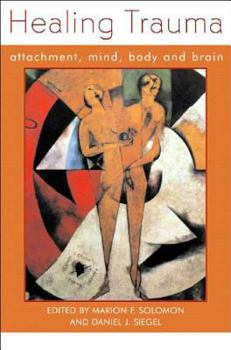Healing Trauma: Attachment, Mind, Body and Brain
As we move into the third millennium, the field of mental health is in an exciting position to bring together diverse ideas from a range of disciplines that illuminate our understanding of human... This description may be from another edition of this product.
Format:Hardcover
Language:English
ISBN:0393703967
ISBN13:9780393703962
Release Date:March 2003
Publisher:W. W. Norton & Company
Length:384 Pages
Weight:1.65 lbs.
Dimensions:1.3" x 6.1" x 9.7"
Customer Reviews
5 ratings
Well written and helpful
Published by Thriftbooks.com User , 14 years ago
This is a well written and helpful book. I'd recommend it for mental health professionals. Other related books that are helpful are: Principles of Trauma Therapy: A Guide to Symptoms, Evaluation, and Treatment Treating Complex Traumatic Stress Disorders: An Evidence-Based Guide Creating Capacity For Attachment Principles of Attachment Parenting Attachment-Focused Family Therapy
We need more of these!
Published by Thriftbooks.com User , 14 years ago
Healing Trauma is composed of a great collection of essays from leading authors in the field. As the interest in trauma and its effects on human brain and psyche increased over the past three decades, considerable diversity in research, theory, and practice has emerged. As a result, especially complex trauma literature became somewhat confusing for professionals and students who are new to the field. The essays in this book not only reflect the latest "state of affairs," but also demonstrate the evolution of the theories that help provide a template to put other diverse texts in perspective. Perhaps a more important strength of this important book is the way it walks the reader through a more complete understanding of trauma. More often than not, we tend to explore one primary aspect of the phenomenon in question. We usually lack interest, emphasis, and as a result, information about other, less popular aspects. Healing Trauma is able to speak to the trauma-relevant information and theories in the neurobiology, development/attachment, and clinical psychology/psychotherapy fields. Therefore, the reader is not only able to understand the epidemiology of trauma aftermath from these diverse perspectives, but also an invaluable understanding for the nature and process of change through psychotherapy is made available. While very important psychotherapy directions and suggestions are provided, through these deeper and more complete conceptualizations for both epidemiology and psychotherapeutic change, clinicians will find that they are able to be more creative in their work upon reading this book. Finally we are beginning to have a meaningful understanding for what happens in the brain throughout lifespan in consideration of individual-environment interactions, which has direct implications for what happens in our therapy rooms!
Healing Trauma
Published by Thriftbooks.com User , 15 years ago
An excellent book for all who work with trauma patients. You will find it an excellent resource for your library.
Brainy and well worth it
Published by Thriftbooks.com User , 19 years ago
This is a scholarly collection of essays from leading theorists in the field of attachment and neurobiology. It provides an exciting, in-depth overview from various perspectives from the inner workings of the brain, to the development of the social mind, to what it all mean for clinicians. There is both theory and practical advice. The last several chapters are particularly relevant to psychotherapists in the field working with individuals with trauma. The down side of the book is that some of the early chapters are somewhat rhedundant and heady, necessarily so in the science presented, but definately overlapping. However, I'd strongly recommend it for all clinicians wanting to stay abreast of the exciting developments in this area. I use it in supervision groups I lead for therapists, for example. It is also a strong follow up to Seigel's The Developing Mind.
Traumas as Social Interactions
Published by Thriftbooks.com User , 19 years ago
We react to serious mishaps, life altering setbacks, disasters, abuse, and death by going through the phases of grieving. Traumas are the complex outcomes of psychodynamic and biochemical processes. But the particulars of traumas depend heavily on the interaction between the victim and his social milieu.It would seem that while the victim progresses from denial to helplessness, rage, depression and thence to acceptance of the traumatizing events - society demonstrates a diametrically opposed progression. This incompatibility, this mismatch of psychological phases is what leads to the formation and crystallization of trauma.This book is a collection of important and incisive insights, by a variety of authors, from different schools of psychology, into the interaction between traumatic processes and attachment modalities and disorders. Indispensable. Sam Vaknin, author of "Malignant Self Love - Narcissism Revisited".





